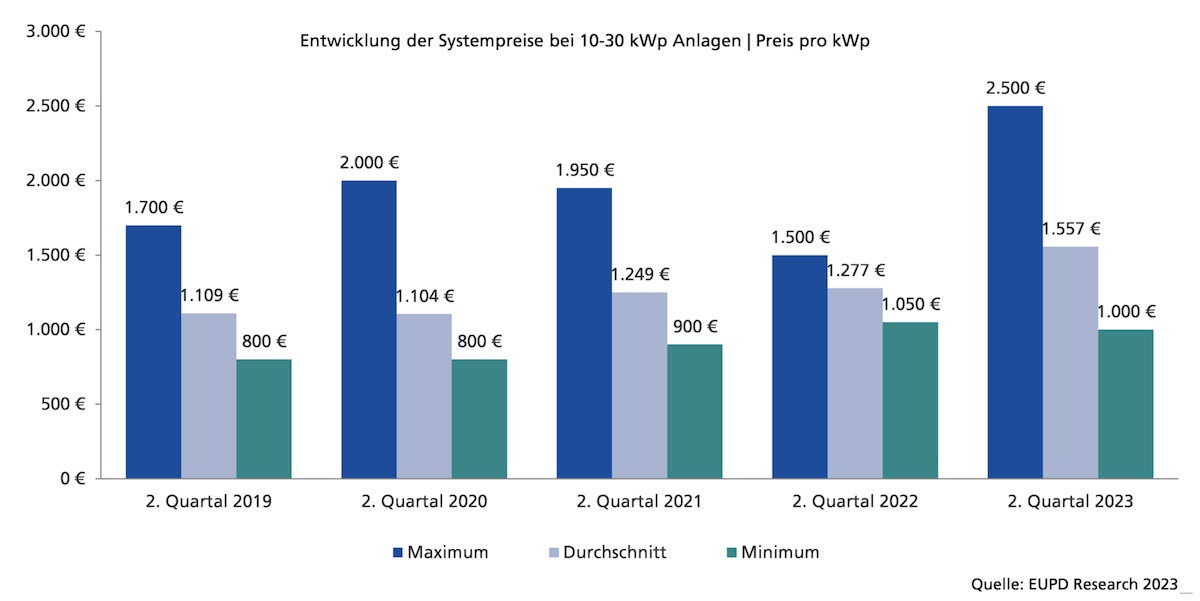From pv magazine Germany
The average system price for rooftop PV systems in German single-family homes with and without battery storage rose by around 10% to €1,557 ($1,711)/kW in the second quarter of 2023, in comparison with the first quarter of the year. The prices are 21.9% higher than the second quarter of 2022 when they stood at €1,277/kW.
Although module prices are currently falling on the international market, there is no reason to postpone investment decisions in the hope of cheaper prices.
“We don't expect system prices for small systems to drop significantly in the next few months,” said Finn Bee, an analyst at EUPD Research. When questioned directly, however, only 28% of installation companies stated that prices had risen. “Last year it was sometimes more than 90%.”
A common reference value for PV systems on single-family homes is 10 kW of solar power and 10 kWh of battery storage capacity. In a survey of 100 installers, EUPD Research found that prices for such systems range from €18,500 to €45,500. The values vary so largely because they are calculated by adding the minimum and maximum values of the storage and the solar systems for size classes below and above 10 kW. The average price is also not a very meaningful metric for comparison with a particular offer. Rather, these figures are best used to determine price trends.
The real prices depend heavily on the installation context, among other things. For example, it depends on whether a new meter is required, on component choice, on the system’s functionalities, and whether a hybrid inverter or several inverters are installed.
The region in which a house is located also plays a role.
“The prices differ regionally by up to 20%,” said Bee.
And, of course, the origin of the products and the type of guarantees differ. Particularly in the last year, many cheaper battery storage devices from previously unknown Chinese manufacturers have entered the market. Minimum prices have fallen as a result, but average and maximum prices have risen.
In the case of solar modules, the price depends on the efficiency, among other things. With the same output power, high-efficiency modules require less space, producing more electricity on the same roof area. Of course, that comes with an extra cost.
In the current issue of pv magazine Germany, experts for large systems have calculated how high the additional costs can be depending on the efficiency without the profitability suffering as a result (“Topcon, HJT, IBC – which new module products are really worthwhile?” and “Only pay for what you get“).
The price range for battery storage is particularly large, as more functionalities play a role in these systems. Those with emergency power functions that take weather forecasts into account usually cost extra.
Overall, homeowners should consider all of these factors when comparing prices between two offers. With the offer on a flyer from Enpal, which is likely to have ended up in many mailboxes at the moment, you not only have to pay attention to whether the price is somewhere in the middle of the large price range, but also whether the components correspond to the price.
pv magazine asked Peter Knuth, the co-founder of Enerix, about prices and components.
“Our partners also usually offer below the average price range,” said Knuth.
The company offers PV systems nationwide via specialist franchise companies. He sees different customer groups. While some are happy to find the cheapest possible prices online, others would appreciate the support provided by regional specialist companies.
These local companies not only provide video advice, but also dedicate one to two hours on-site to assess specific conditions, including electrical installations.
“They then advise, for example, on the installation of metal roof tiles, if necessary,” said Knuth.
In regions with heavy snowfall and potential risks of tile breakage from roof hooks, this scenario might apply. The guidance enhances confidence in the quality and durability of the product because customers, as stated by Knuth, often struggle to evaluate the technical aspects independently.
This content is protected by copyright and may not be reused. If you want to cooperate with us and would like to reuse some of our content, please contact: editors@pv-magazine.com.



2 comments
By submitting this form you agree to pv magazine using your data for the purposes of publishing your comment.
Your personal data will only be disclosed or otherwise transmitted to third parties for the purposes of spam filtering or if this is necessary for technical maintenance of the website. Any other transfer to third parties will not take place unless this is justified on the basis of applicable data protection regulations or if pv magazine is legally obliged to do so.
You may revoke this consent at any time with effect for the future, in which case your personal data will be deleted immediately. Otherwise, your data will be deleted if pv magazine has processed your request or the purpose of data storage is fulfilled.
Further information on data privacy can be found in our Data Protection Policy.